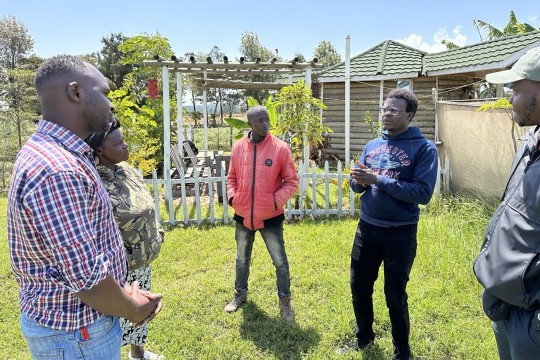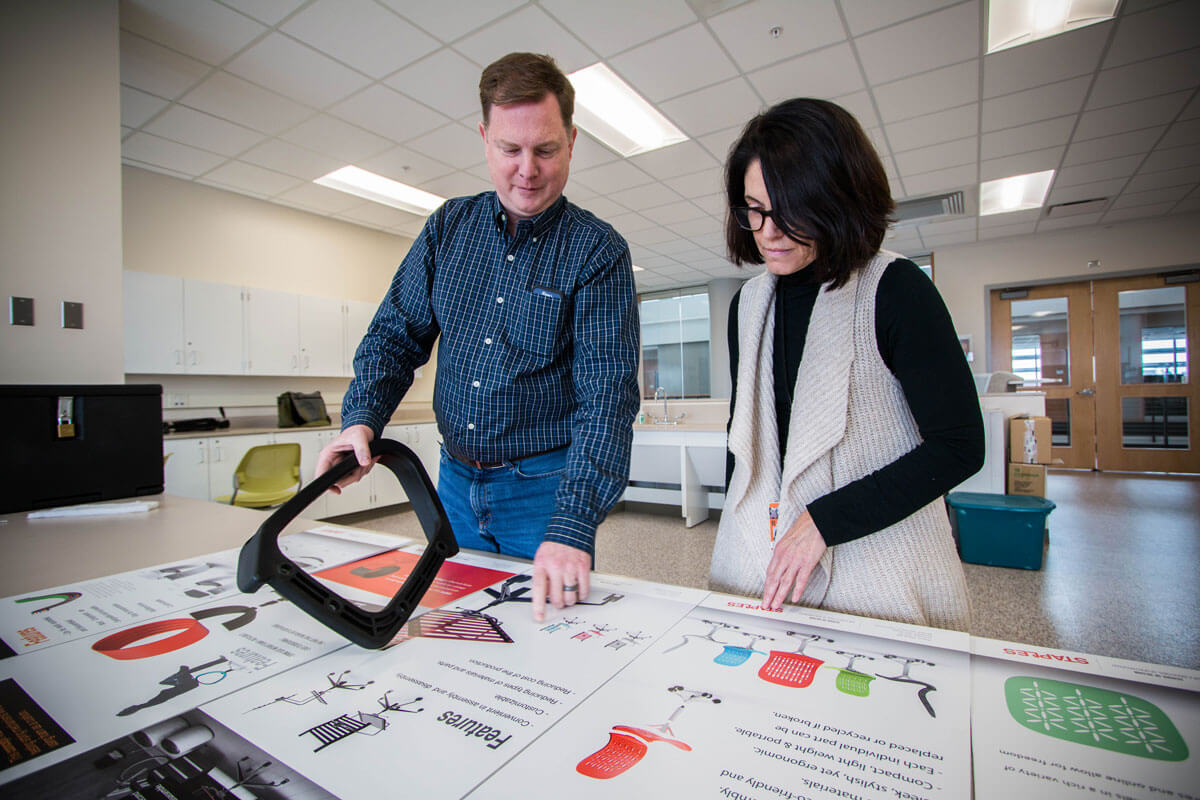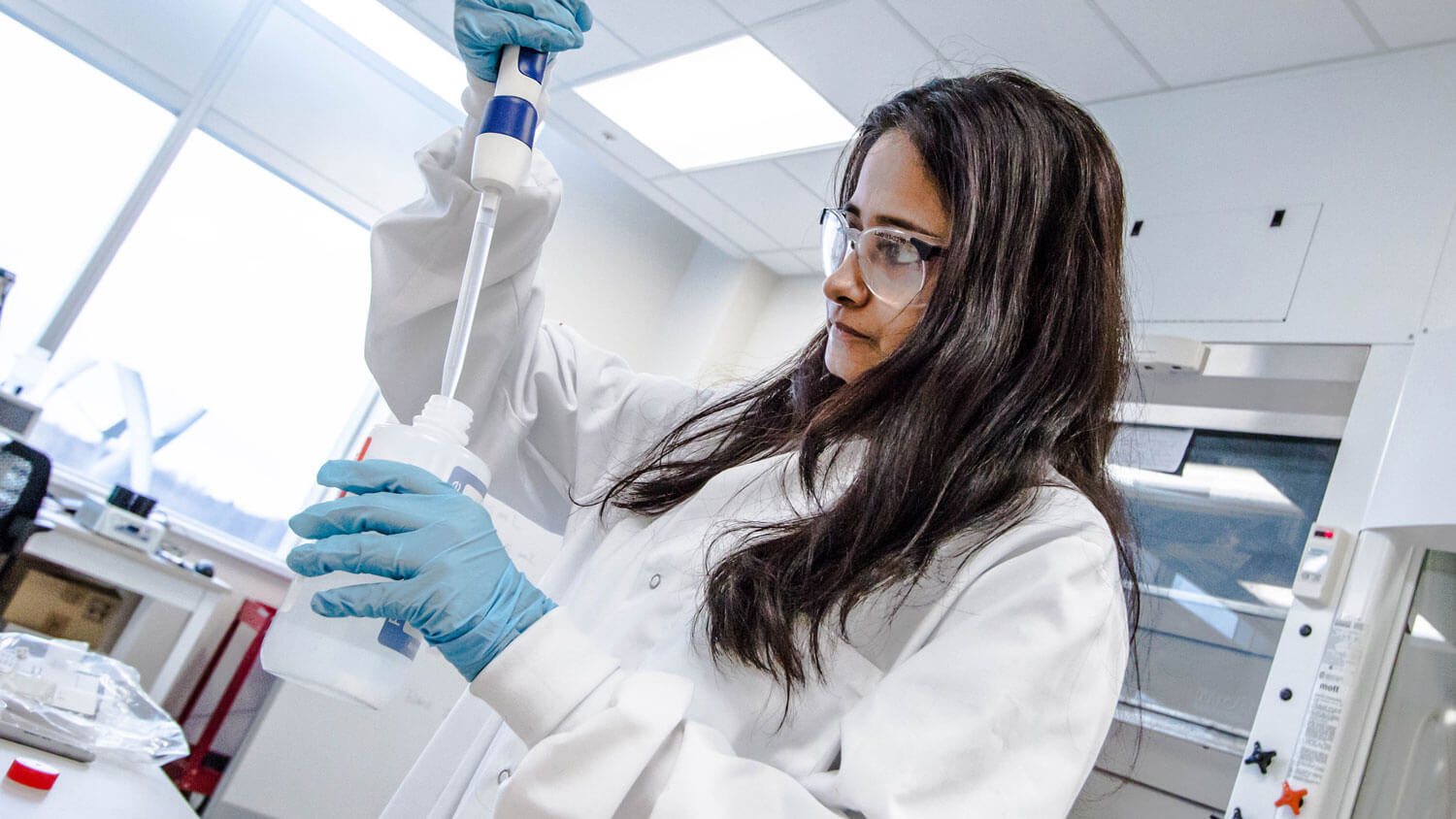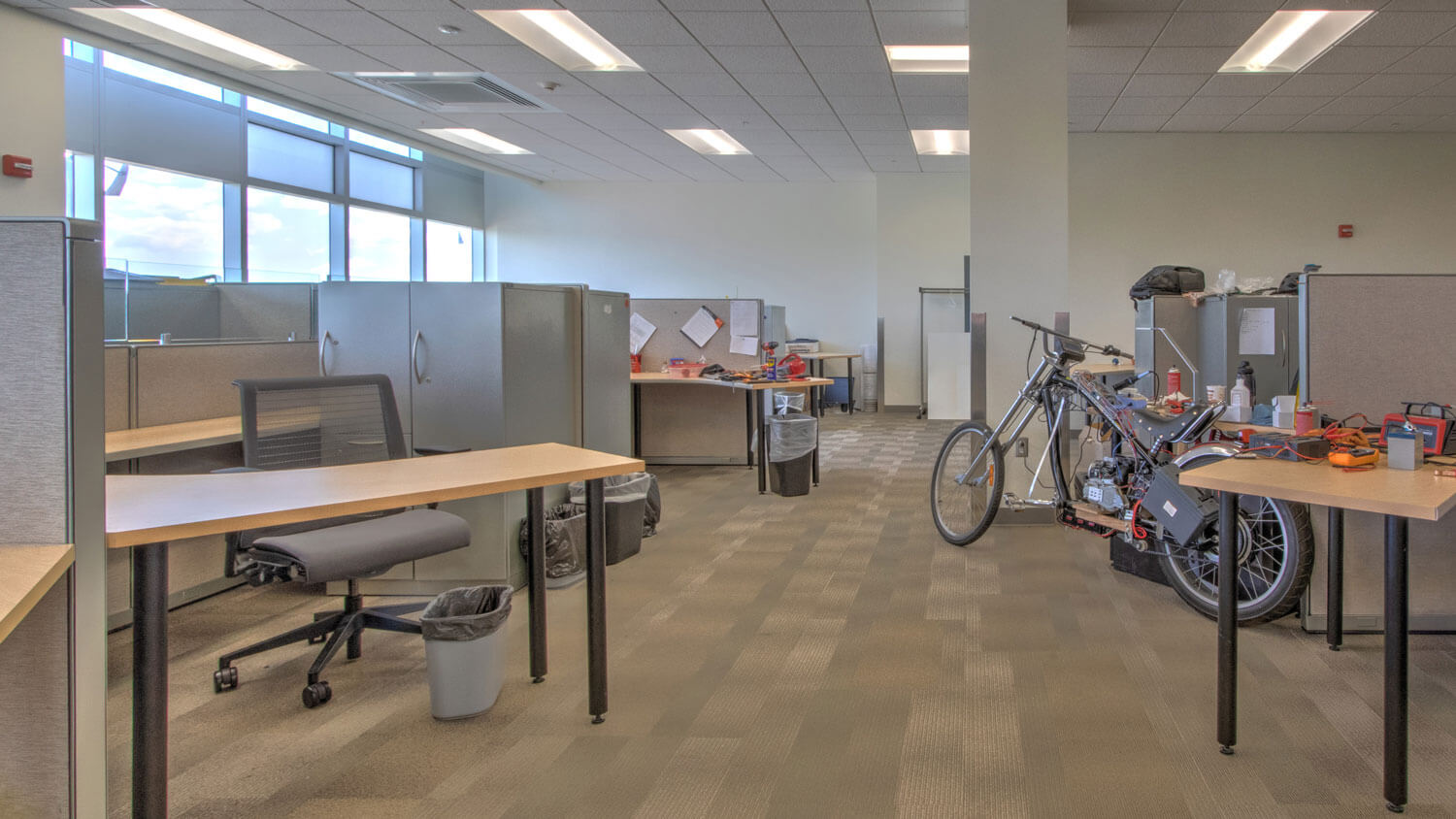Sustainable Systems Master of Science Degree

Sustainable Systems
Master of Science Degree
- RIT /
- Rochester Institute of Technology /
- Academics /
- Sustainable Systems MS
A sustainability degree that teaches you to apply sustainability science principles to any field to help solve the world’s grand challenges—including pollution, food scarcity, public health crises, and more.
Overview for Sustainable Systems MS
The sustainable systems MS degree accepts students from any academic background and encompasses a wide range of interdisciplinary studies in sustainability science. Here, you won’t be restricted to one sustainability topic or methodology. You will comprehensively learn and experience the methods that lead to environmental, social, technological, and business success, working one-on-one with a faculty advisor to tailor the degree to your sustainability interests.
RIT's Sustainable Degree
In our sustainable master's program, you will start with a broad foundation of knowledge in environmental life cycle assessment, sustainable decision making, economic and policy strategies, and more. Then, you will have the opportunity to customize your degree in areas that suit your interests and career goals—such as renewable energy or mobility—as well as get the hands-on experience that employers are seeking. In as little as one year of study, you will be prepared to make sustainability decisions that you can apply to any career.
Not only will you be able to focus on an area that interests you, but you will be able to get hands-on in your projects with the use of one of our many labs or through design modeling tools. This degree allows you the flexibility to adapt your career over time and in response to the ever-changing developments in sustainability. The Golisano Institute for Sustainability is dedicated to groundbreaking sustainability research and its business applications. Our research facilities are second to none, and include a number of green buildings including Sustainability Institute Hall, a 75,000-square-foot, LEED Platinum-certified research building and multiple state-of-the-art research centers.
You don’t need a background in sustainability to apply to this program; just a desire to create positive change in the world. We accept applicants of all ages, from all backgrounds—from mechanical engineering to political science—and from all over the world. This ensures your learning experience comes from the classroom as well as from the perspectives of students with diverse experiences.
Sustainability Curriculum
Through a flexible and interdisciplinary curriculum, you’ll begin your degree in sustainable systems with core courses in industrial ecology, risk assessment, the economics of sustainability, and more. Several electives from across the university–in areas as diverse as from sustainable craft brewing and distilling to corporate social responsibility–allow you to tailor your degree around your talents and career goals.
Your degree culminates with a research thesis or a capstone project. Recent thesis examples include:
- Techno-Environmental Analysis of Generating Animal Feed from Wasted Food Products
- Fabrication and life cycle assessment of organic photovoltaics
- Characterizing adaptive capacity to climate change in developing countries: a case study on Peru
Sustainability Topics / Tracks
Sustainable Energy
- Sustainable Energy Systems
- Food-Energy-Water Nexus
- Energy Policy
Example research project: Inspection of wind turbine blades with unmanned aerial vehicles (UAVs)
Circular Economy
- Introduction to Geographic Information Systems (GIS)
- Data Analysis for Sustainability
- Innovation Policy
- Corporate Social Responsibility (CSR)
Example research project: Assessing a baseline case for reaching carbon neutrality in Monroe County by 2027
Sustainable Urban Systems
- Sustainable Mobility Systems
- Graduate Sustainable Communities
- Sustainable Building Metrics
Example research project: Evaluating strategies for sustainable renovation of RIT campus buildings
Careers in Sustainability
Graduates of the sustainable systems MS have a 100 percent placement rate, in part because of RIT’s dedication to career counseling and ongoing relationships with employers. This means that all of our graduates gain employment or choose to further their education shortly after graduating. And If you’re interested in pursuing a career more focused on academia or research, the master’s degree is also an excellent stepping stone to a doctoral program, such as RIT’s Ph.D. in sustainability, if you take the route of completing a thesis while here.
Sustainability Resources: RIT Advances Global Sustainability
Partnering locally and internationally with the communities in which we are engaged, RIT is continuing to advance sustainability efforts and build resiliency at home and around the world. Rochester, NY, is a hub for sustainability professionals and home to rich natural resources, such as fertile farmland and the nearby Finger Lakes. Many of our students share their passion for sustainability with the local community by volunteering on projects connected to K-12 education, community gardens, farmer’s markets, and more. In addition, you will connect with the global sustainability community by attending and presenting at professional conferences all over the world.
-
Join us for Fall 2025
Many programs accept applications on a rolling, space-available basis.
-
30% Tuition Scholarship for NY Residents and Graduates
Now is the perfect time to earn your Master’s degree. If you’re a New York state resident with a bachelor’s degree or have/will graduate from a college or university in New York state, you are eligible to receive a 30% tuition scholarship.
-
Next Steps to Enroll
Accept your offer of admission and take the next steps toward becoming an RIT Tiger.
Careers and Salary Info
Typical Job Titles
| Associate Engineer - Energy Efficiency | Clean Power and Industrial Efficiency Project Engineer | Energy and Sustainability Engineer |
| Health Care Information Analyst | Solutions Engineer | Sustainability Analyst |
| US Power Analyst |
Featured Work and Profiles
-
Does energy storage make the U.S. electric grid cleaner?
Dr. Eric Williams In brief: Project: “How much wind and solar are needed to realize emissions benefits from storage?”
Read More about Does energy storage make the U.S. electric grid cleaner? -
Can paper waste be used to make black ink?
Dr. Thomas A. Trabold In brief: Project: “Waste Paper Derived Biochar for Sustainable Printing Products”
Read More about Can paper waste be used to make black ink? -
Graduate Credits MS Degree for Launching Career in Sustainability
Erin Semple '14 MS (sustainable systems) is a Product Stewardship Manager at the Eastman Kodak Co.
Read More about Graduate Credits MS Degree for Launching Career in Sustainability -
JT Coneybeer '15
"I use the efficiency assessment skills I learned at GIS everyday as an energy engineer to evaluate energy-consuming systems. Thanks to plenty of hands-on projects and inspiring classroom...
Read More about JT Coneybeer '15 -
Ricardo Dias '15
"GIS really expanded the ways in which I am empowered to positively impact the world. The things I learned and experienced in the MS program led me to successfully start my own energy management...
Read More about Ricardo Dias '15 -
Nanomaterials: To use or not to use
Dr. Elizabeth Moore ’19 The following learning module was created by Dr. Elizabeth Moore '19 as a student for public teaching use.
Read More about Nanomaterials: To use or not to use
Curriculum for 2024-2025 for Sustainable Systems MS
Current Students: See Curriculum Requirements
Sustainable Systems (capstone option), MS degree, typical course sequence (semesters)
| Course | Sem. Cr. Hrs. | |
|---|---|---|
| First Year | ||
| ISUS-702 | Fundamentals of Sustainability Science |
3 |
This course prepares students to understand grand challenges in sustainability, conduct original research related to sustainable production and consumption systems, and apply the scientific method in an integrative, team-based approach to graduate research. This course introduces fundamental concepts that are essential to understanding the interaction of economic, environmental, and social systems. Successful students will understand multiple perspectives on sustainability, the importance of sustainability as an ethical concept, behavioral impacts to sustainable solutions, and a life-cycle approach to organizing research related to sustainability. It is a core course within the Sustainability program. (This class is restricted to students in the SUSTSY-MS and SUST-PHD programs.) Lecture 3 (Fall). | ||
| ISUS-704 | Industrial Ecology |
3 |
Industrial ecology is the study of the interaction between industrial and ecological systems. Students in this course learn to assess the impact and interrelations of production systems on the natural environment by mastering fundamental concepts of ecology as a metaphor for industrial systems and the resultant tools from industrial ecology, including life cycle assessment, material flow analysis, and energy and greenhouse gas accounting. This is a core course within the Sustainability Ph.D. program. (This class is restricted to students in the SUSTSY-MS and SUST-PHD programs.) Lecture 3 (Fall). | ||
| ISUS-706 | Economics of Sustainable Systems |
3 |
The goal of this course is to introduce students to economic concepts and analysis pertaining to sustainable systems. This course offers a nontechnical but rigorous introduction to microeconomic theory, engineering economics, and benefit-cost analysis. A thorough treatment of models relevant to each topic is provided. The over-arching goal is for students to gain an understanding of the logic of economic reasoning and analysis as it pertains to the study of sustainable systems. (This class is restricted to students in the SUSTSY-MS and SUST-PHD programs.) Lecture 3 (Fall). | ||
| ISUS-780 | Capstone (summer) |
6 |
An independent project in sustainability serving as a capstone experience for students completing the non-thesis option. This course requires a formal proposal and a faculty sponsor. Lecture (Fall, Spring, Summer). | ||
| ISUS-806 | Risk Analysis |
3 |
This course examines risk identification, quantification, and management from the standpoint of the three key components of sustainability science (economics, environment, and society). Subjects include cost-benefit analysis, value of information, time value of money, basic decision analysis, value functions, monetizing challenges for ecosystem services, sustainability risk management, toxicological perspectives such as fate and transport and dose-response relationships, risk perception, ethical issues in risk quantification, and impact statements. (This class is restricted to students in the SUSTSY-MS and SUST-PHD programs.) Lecture 3 (Fall). | ||
| ISUS-808 | Multicriteria Sustainable Systems |
3 |
This class will explore how decisions are made when confronted with multiple, often conflicting, criteria or constraints. The focus will be on the following analytical methods: linear and stochastic programming, optimization, and Monte Carlo simulation. Case studies will focus on sustainability multi-criteria problems such as energy planning, sustainable development, resource management, and recycling. Students will apply methods learned to a project involving their graduate research. (This class is restricted to students in the SUSTSY-MS and SUST-PHD programs.) Lecture 3 (Spring). | ||
| PUBL-810 | Technology, Policy and Sustainability (or approved substitute) |
3 |
This course introduces students to public policy and its role in building a sustainable society. The course places particular emphasis on the policy process; the relationship among technology, policy, and the environment; and policy mechanisms for addressing market and government failures that threaten sustainability. Lecture 3 (Fall, Spring). | ||
Electives |
6 | |
| Total Semester Credit Hours | 30 |
|
Sustainable Systems (thesis option), MS degree, typical course sequence (semesters)
| Course | Sem. Cr. Hrs. | |
|---|---|---|
| First Year | ||
| ISUS-702 | Fundamentals of Sustainability Science |
3 |
This course prepares students to understand grand challenges in sustainability, conduct original research related to sustainable production and consumption systems, and apply the scientific method in an integrative, team-based approach to graduate research. This course introduces fundamental concepts that are essential to understanding the interaction of economic, environmental, and social systems. Successful students will understand multiple perspectives on sustainability, the importance of sustainability as an ethical concept, behavioral impacts to sustainable solutions, and a life-cycle approach to organizing research related to sustainability. It is a core course within the Sustainability program. (This class is restricted to students in the SUSTSY-MS and SUST-PHD programs.) Lecture 3 (Fall). | ||
| ISUS-704 | Industrial Ecology |
3 |
Industrial ecology is the study of the interaction between industrial and ecological systems. Students in this course learn to assess the impact and interrelations of production systems on the natural environment by mastering fundamental concepts of ecology as a metaphor for industrial systems and the resultant tools from industrial ecology, including life cycle assessment, material flow analysis, and energy and greenhouse gas accounting. This is a core course within the Sustainability Ph.D. program. (This class is restricted to students in the SUSTSY-MS and SUST-PHD programs.) Lecture 3 (Fall). | ||
| ISUS-706 | Economics of Sustainable Systems |
3 |
The goal of this course is to introduce students to economic concepts and analysis pertaining to sustainable systems. This course offers a nontechnical but rigorous introduction to microeconomic theory, engineering economics, and benefit-cost analysis. A thorough treatment of models relevant to each topic is provided. The over-arching goal is for students to gain an understanding of the logic of economic reasoning and analysis as it pertains to the study of sustainable systems. (This class is restricted to students in the SUSTSY-MS and SUST-PHD programs.) Lecture 3 (Fall). | ||
| ISUS-806 | Risk Analysis |
3 |
This course examines risk identification, quantification, and management from the standpoint of the three key components of sustainability science (economics, environment, and society). Subjects include cost-benefit analysis, value of information, time value of money, basic decision analysis, value functions, monetizing challenges for ecosystem services, sustainability risk management, toxicological perspectives such as fate and transport and dose-response relationships, risk perception, ethical issues in risk quantification, and impact statements. (This class is restricted to students in the SUSTSY-MS and SUST-PHD programs.) Lecture 3 (Fall). | ||
| ISUS-808 | Multicriteria Sustainable Systems |
3 |
This class will explore how decisions are made when confronted with multiple, often conflicting, criteria or constraints. The focus will be on the following analytical methods: linear and stochastic programming, optimization, and Monte Carlo simulation. Case studies will focus on sustainability multi-criteria problems such as energy planning, sustainable development, resource management, and recycling. Students will apply methods learned to a project involving their graduate research. (This class is restricted to students in the SUSTSY-MS and SUST-PHD programs.) Lecture 3 (Spring). | ||
Elective |
3 | |
| Second Year | ||
| ISUS-790 | Thesis |
6 |
Independent research in sustainability leading to the completion of the MS thesis. This course requires a formal proposal and a faculty sponsor. Thesis (Fall, Spring, Summer). | ||
| PUBL-810 | Technology, Policy and Sustainability (or approved substitute) |
3 |
This course introduces students to public policy and its role in building a sustainable society. The course places particular emphasis on the policy process; the relationship among technology, policy, and the environment; and policy mechanisms for addressing market and government failures that threaten sustainability. Lecture 3 (Fall, Spring). | ||
Elective |
3 | |
| Total Semester Credit Hours | 30 |
|
Students are also interested in
Admissions and Financial Aid
This program is available on-campus only.
| Offered | Admit Term(s) | Application Deadline | STEM Designated |
|---|---|---|---|
| Full‑time | Fall or Spring | Rolling | Yes |
| Part‑time | Fall or Spring | Rolling | No |
Full-time study is 9+ semester credit hours. Part-time study is 1‑8 semester credit hours. International students requiring a visa to study at the RIT Rochester campus must study full‑time.
Application Details
To be considered for admission to the Sustainable Systems MS program, candidates must fulfill the following requirements:
- Complete an online graduate application.
- Submit copies of official transcript(s) (in English) of all previously completed undergraduate and graduate course work, including any transfer credit earned.
- Hold a baccalaureate degree (or US equivalent) from an accredited university or college. A minimum cumulative GPA of 3.0 (or equivalent) is recommended.d university or college.
- Satisfy prerequisite requirements and/or complete bridge courses prior to starting program coursework.
- Submit a current resume or curriculum vitae.
- Submit a personal statement of educational objectives.
- Submit two letters of recommendation.
- Entrance exam requirements: None
- Submit one writing sample, of your own work, in which you are the only author. This can be a report or paper from previous academic or professional work that reflects your critical thinking and writing abilities.
- Submit English language test scores (TOEFL, IELTS, PTE Academic), if required. Details are below.
English Language Test Scores
International applicants whose native language is not English must submit one of the following official English language test scores. Some international applicants may be considered for an English test requirement waiver.
| TOEFL | IELTS | PTE Academic |
|---|---|---|
| 88 | 6.5 | 60 |
International students below the minimum requirement may be considered for conditional admission. Deaf and hard-of-hearing test takers with significant hearing loss do not need to take the listening and speaking sections for the TOEFL and IELTS. Each program requires balanced sub-scores when determining an applicant’s need for additional English language courses.
How to Apply Start or Manage Your Application
Cost and Financial Aid
An RIT graduate degree is an investment with lifelong returns. Graduate tuition varies by degree, the number of credits taken per semester, and delivery method. View the general cost of attendance or estimate the cost of your graduate degree.
A combination of sources can help fund your graduate degree. Learn how to fund your degree
Additional Information
Prerequisites
The Sustainable Systems MS program requires that students gain mastery of key sustainability concepts and methods, several of which are quantitative in nature. Due to this, we require incoming students to have taken university-level calculus, statistics, and two courses in physical sciences (such as chemistry or physics).
MS/MBA Option
Students are eligible to earn an MBA in just one year after completing the Sustainable Systems MS. This combination of graduate degrees allows students to learn business, policy, engineering, and science behind our world's systems to gain knowledge to solve any sustainability problem. Admission to the MBA is automatic upon successful completion of the MS, with scholarship guaranteed. Students admitted to the program graduate as dual-degree holders—with both a Master of Science and an MBA—in just two years. For more details on this accelerated pathway, visit: Sustainable Systems MS & MBA.
Related News
-
February 5, 2025

GIS introduces master’s collaboration with Zurich University of Applied Sciences
The Golisano Institute for Sustainability (GIS) at Rochester Institute of Technology has partnered with Zurich University of Applied Sciences (ZHAW) in Switzerland to launch a dual-degree master’s program.
-
November 20, 2024

RIT professor helps to tackle energy access in rural Africa
Williams’ collaborative work tackles the subject of energy access in Sub-Saharan Africa. In 2015, the United Nations established Sustainable Development Goal 7 to ensure access to affordable, reliable, sustainable, and modern energy for all.
-
June 3, 2024

RIT to offer new pathway for earning MS in sustainable systems and MBA degrees
The Rochester Business Journal talks to Amit Batabyal, the Arthur J. Gosnell Professor of Economics and interim head of the Department of Sustainability, and Bill Dresnack, associate professor in the Department of Finance and Accounting, about the collaborative degree.
Contact
- Karen Palmer
- Senior Associate Director Grad Enrollment
- Office of Graduate and Part-Time Enrollment Services
- Enrollment Management
- 585‑475‑5656
- kbpges@rit.edu
- Nathan Williams
- Assistant Professor
- Department of Sustainability
- Golisano Institute for Sustainability
- 585‑475‑5802
- njwgis@rit.edu

























